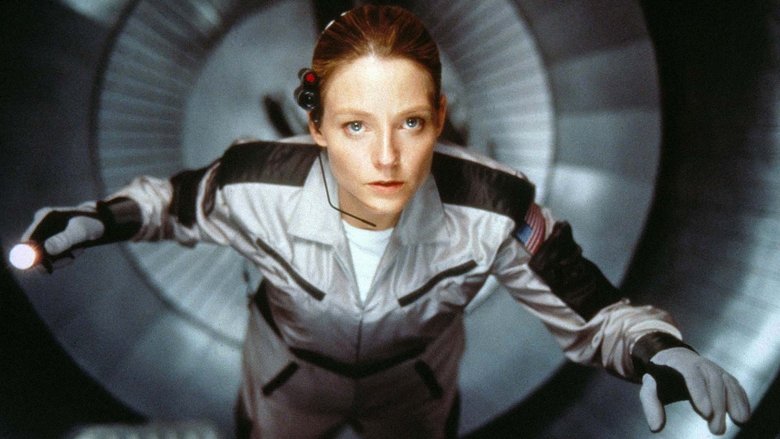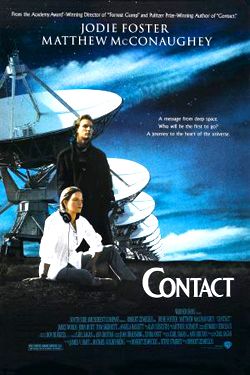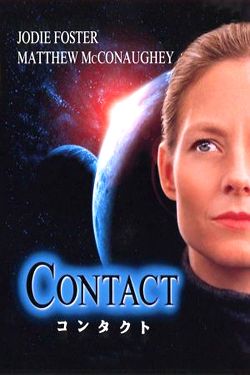← Back to Reviews

in

|

|
Year of release
1997
1997
Directed by
Robert Zemeckis
Robert Zemeckis
Written by
James V. Hart
Michael Goldenberg
Carl Sagan (novel)
James V. Hart
Michael Goldenberg
Carl Sagan (novel)
Starring
Jodie Foster
Matthew McConaughey
James Woods
Tom Skerritt
William Fichtner
John Hurt
Jodie Foster
Matthew McConaughey
James Woods
Tom Skerritt
William Fichtner
John Hurt
Contact
++
Plot - Encouraged by her father at a young age, Dr Ellie Arroway (Foster) has developed a life-long fascination with the possibility of there being alien life somewhere out there in the universe. Following years of fruitless searching Ellie stumbles upon an intelligent signal being broadcast from outer space. When Ellie and her fellow scientists decipher the message within the broadcast they find themselves with blueprints to build some kind of machine which they believe will allow for galactic travel. These revelations prompt vastly differing opinions amongst humanity, in particular pitting the realms of science against religion. This is mirrored in the relationship and potential romance between the atheistic Arroway and Palmer Joss (McConaughey), a renowned Christian philosopher who becomes part of the group that will decide who gets the change to go into space and meet the alien race. Dr Arroway is one of those in the running, but her lack of religious faith may prove a stumbling block. And it's not the only one that the project faces.
I'm aware that this film seems to generate quite a lot of negative opinions in people, and while I can perhaps understand them I've got to say that I actually really enjoyed Contact. It takes the classic set-up of making first contact with an alien species and treats it in an intelligent and detailed manner, whereas commonly you would expect the likes of Keanu Reeves or Bruce Willis to be sent to meet the aliens. Throughout the film we never actually bear witness to any aliens, well apart from one who takes on human form, and while it may disappoint some sci-fi fans I actually find it quite fitting as this is not so much a film about alien lifeforms as it is about humanity. In fact it's probably amongst the most realistic depictions you will ever see in terms of the response of the world to such an event. It details how even with this most incredible of events, the most important in the history of humanity, it would get bogged down in politics. It would all be tied up in politics and posturing between nations, and humanity would be split in its reaction. I loved the sequence that depicted the circus that springs up outside the facility where the machine is being constructed; with thousands of people camping out it's a glorious mix of alien-welcoming nutters dressed up like aliens from 1950s B-movies, Nazis, religious zealots, an Elvis impersonator, a choir singing a song in praise of the aliens, lots of trailer trash and even a company offering insurance against UFO abduction. It is all witnessed by the highly bemused Foster. Obviously the main thrust of the film in terms of themes is one of the biggest and oldest of them all, science versus religion. It takes the time to pose and explore many questions that theme encompasses; are we alone in the universe? What are the implications if we aren't? What would it mean to the notion of a God? If we made contact with a civilization vastly advanced of our own, would they come in peace? All of those questions and more and tackled in an intelligent and thought-provoking fashion. While Zemeckis' handling of the film and the narrative of building and launching the machine make sure that we don't get bogged down in all this philosophising.
For the majority of the film I found Jodie Foster to be a solid lead but nothing all that noteworthy. However I felt that she really came into her own down the closing stretch. As soon as her character is allowed into the machine and to fulfil her dreams I thought she was excellent. I was particularly taken with her efforts whilst sitting in the machine waiting for it to be initiated. She displays a terrific mix of pain and fear at what she is going through and what lies ahead, but also a real determination that she is not going to let this opportunity pass her by. On the verge of tears and with her voice cracking she is able to utter through gritted teeth over and over again that “I'm ok to go.” I thought it was a great piece of acting and a level she kept up through the rest of the film. Her sense of both terror and sheer wonder as she is being traversed across the universe through the system of wormholes and at meeting the alien work perfectly. Her character lost both of her parents at a very young age and she seems to have a real fear of commitment, she appears to be scared to get close to anyone which is perhaps where her fascination with aliens comes from. After all why not dedicate your life to trying to communicate with someone who may not exist, and even if they do the odds of doing so are astronomical. Foster shows this through a touching sense of naivety and fear when it comes to relating to other characters, particularly the character played by Matthew McConaughey. Speaking of which...
Matthew McConaughey fell rather flat but in fairness to him that was partly down to the character he was saddled with. Employing his fallback surfer dude type persona he just feels complete out of place and at no point was I convinced that he was this deeply religious theologian and philosopher deemed important enough to be an aide to the President. Now as to who you blame for the style of performance he puts in I guess that will depend on your personal feelings. Is it the fault of whoever had final say in casting him in the first place? Is it McConaughey's fault for employing such a style? Or should Zemeckis identify it as a problem and suggest a different approach? Whatever the case it just never really worked for me. Tom Skerritt gets a lot of mileage out of his character, the closest that we get to a villain in the film. Portraying David Drumlin, a government scientist and scientific aide to the President, he is a despicable little slimeball; it's a while since I've hated someone quite as much. The reason for that is he is not an over-the-top villain; he's hateful because he is all too human. The majority of us don't know serial killers or psychotic murderers (well at least I'm hoping that's the case) but we probably all know someone like Drumlin; someone who lies, manipulates, backstabs and steals credit and fame they do not deserve. James Woods succeeds in similar fashion as National Security Advisor Michael Kits; a real bureaucratic piece of s*it! Both characters may be rather one-dimensional creations but Woods and Skerritt make the absolute most of them.
In mainstream terms is there a director out there who has made more great films without getting a great degree of recognition than Robert Zemeckis? I have to admit that in the past I was one of those people not giving him the respect he deserved. It was only when I put together my list of favourite films that I realised, “hey this guy has made a lot of movies I love.” The Back to the Future trilogy, Cast Away. Forrest Gump, Who Framed Roger Rabbit, Romancing the Stone etc - The man really does have a great filmography to put on his CV. So why exactly does he not have the same standing that many of his films enjoy? Perhaps it's the fact that he doesn't have a distinctive style that links his films like a Terry Gilliam, a John Woo or a Tim Burton. Perhaps it's that he's not got a identifiable persona. You don't see his face in magazines, you don't see him on chat shows etc. Whereas there are numerous directors that would be instantly recognisable to many people, not just films buffs (Tarantino, Spielberg, Scorsese, Hitchcock, Peter Jackson etc) I think most would struggle to identify Zemeckis. I'd like to think that if I was shown a picture of him I may recognise him but right now I can't honestly picture his face. He's a great storyteller and a man with an eye for a iconic shot.
Film Trivia Snippets - The film's opening features an impressive pullback scene which starts on Earth and zooms out past countless planets and galaxies. To achieve this sequence took over 117,000 hours of computer rendering to create the CGI required. The servers crashed more than 25 times during the process, while the longest render time for a single frame was over 18 hours. Some of the film's visual effects where actually done by Peter Jackson as a way of repaying Robert Zemeckis for executive-producing Jackson's film, The Frighteners. /// At one point during the film, once Ellie has been selected to go into space, she is offered a suicide pill for the trip in case something goes wrong. The film posits that such pills were offered to all astronauts on NASA missions in case they were unable to return to Earth. This is a claim lifted from Carl Sagan's novel. However former astronaut Jim Lovell, commander of the ill-fated Apollo 13 mission, disputes this claim. /// The film has a unique holding in fashion circles. It was the last movie ever seen by the famous Italian fashion designer Gianni Versace. He was shot and killed mere hours following the screening. /// As I mentioned earlier at one point in the film we see a company offering 'UFO Abduction Insurance.' The banner advertising the service was actually taken from a real company which offers such insurance. Warner Bros. Paid the company to use their novel idea in the movie.
He's also always been one to embrace new technology and the advances in special effects, but the most admirable aspect has been how he has employed it, usually using it only to advance and aid the story instead of overwhelming it as so many directors do. And it's a similar case here in Contact. The most impressive aspect of his direction here in my eyes was his handling of the special effects. There are used very minimally throughout the film but when they are they are excellent and used intelligently. As with Foster's performance the special effects really come to the fore as the film approaches its conclusion. The huge machine that is built based on the specifications provided by the aliens is a great design and it is beautifully realised by the effects, both in design and when in operation. Following that, the effects also do a great job at creating the incredible journey that Foster's Arroway goes on; a thrilling and disorientating ride. The CGI also creates a real shock in the vividly realised terrorist attack upon the machine. Although to be fair to the film it also employs the special effects to provide an astonishing zoomout at the film's beginning, starting on Earth and pulling out back past planets and out into the cosmos, through countless galaxies and solar systems. The point of this scene is that we are following the path of the radio broadcasts which have been sent out from Earth over the years, and as such we get a series of broadcasts playing as the background noise. It's a great opening scene, not even ruined by the inclusion of the Spice Girls!  Oh and in a move similar to Zemeckis' Forrest Gump, special effects were also employed to digitally meld footage of the actors and President Clinton together so that it looked like they were interacting.
Oh and in a move similar to Zemeckis' Forrest Gump, special effects were also employed to digitally meld footage of the actors and President Clinton together so that it looked like they were interacting.
 Oh and in a move similar to Zemeckis' Forrest Gump, special effects were also employed to digitally meld footage of the actors and President Clinton together so that it looked like they were interacting.
Oh and in a move similar to Zemeckis' Forrest Gump, special effects were also employed to digitally meld footage of the actors and President Clinton together so that it looked like they were interacting.It's certainly not a perfect film by any means. As I already laid out earlier on, it has a few rather one-dimensional characters and the Matthew McConaughey character just never clicks. And the romance that is played out by McConaughey and Foster's characters feels very forced, coming across like one of the film's only adherences to the staples of a typical big budget flick. In addition to that there are a few other faults to be found. Contact has a running time of nigh on two and a half hours, so it's a long film and at times it does feel it. There are stretches where little happens and you may find your patience being tested but there are developments which keep the level of intrigue bubbling over (such as the terrorist angle) and I certainly felt like it had all been worth it thanks to the last 45 minutes or so which really won me over. There are also numerous occasions throughout the film where I didn't feel like the passage of time had been all that clearly defined. I was frequently unsure as to how long the political discussions had been going on for, how long it took to build the machine etc. I'm sure that some people will also find the film rather emotionally manipulative, maudlin even, and I can see that but in the end it proved very effective for me, creating a touching and emotional pay-off.
Conclusion - Contact may still offer the audience terrific special effects and some excellent set-pieces, but it has a lot more to offer than your typical sci-fi film of this nature; an enlightened and astute look at humanity, the need for faith in some people and the curiousity that humanity has about our wider universe. With a resolute performance from Foster and fine storytelling from Zemeckis I found this to be a very satisfying experience.
